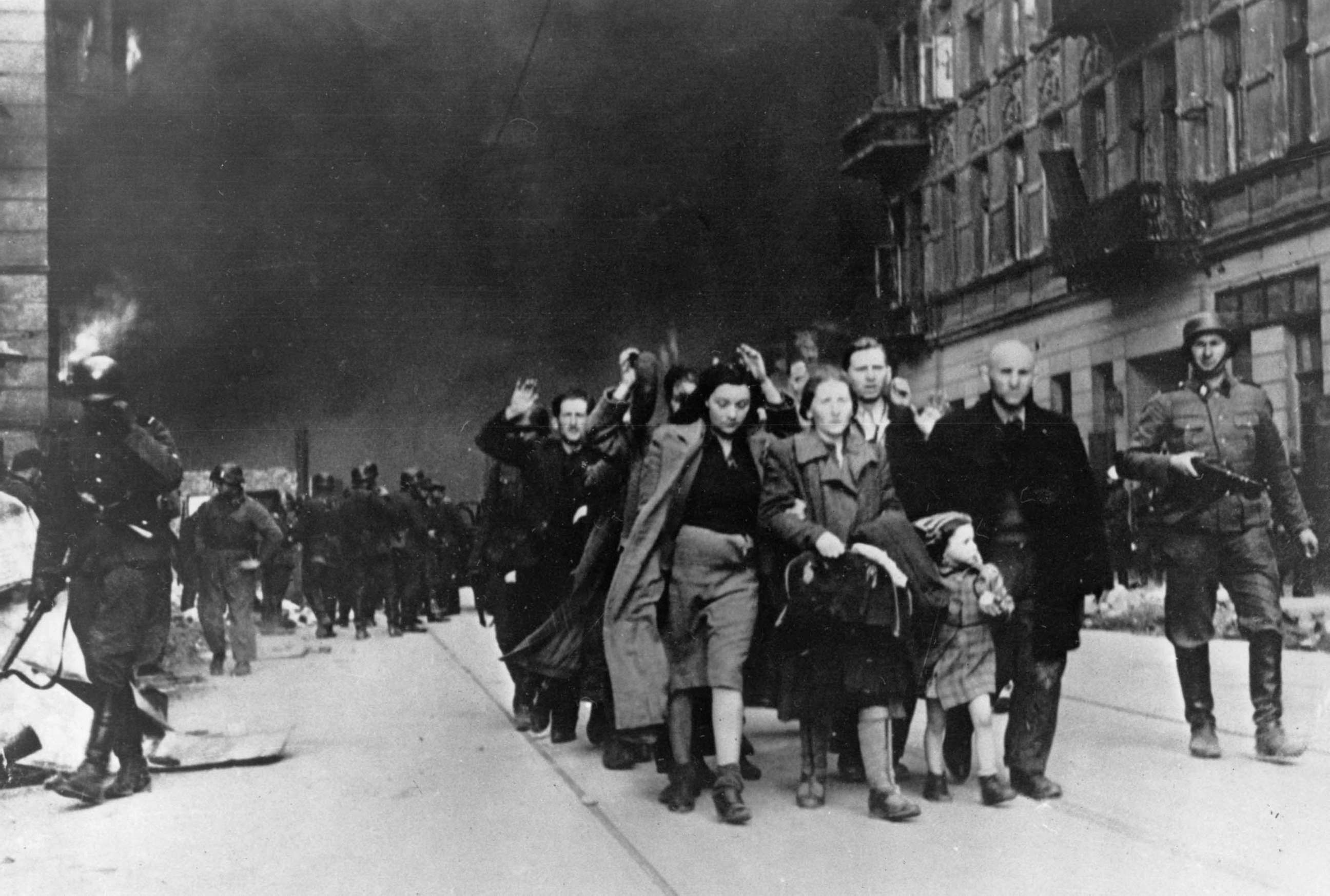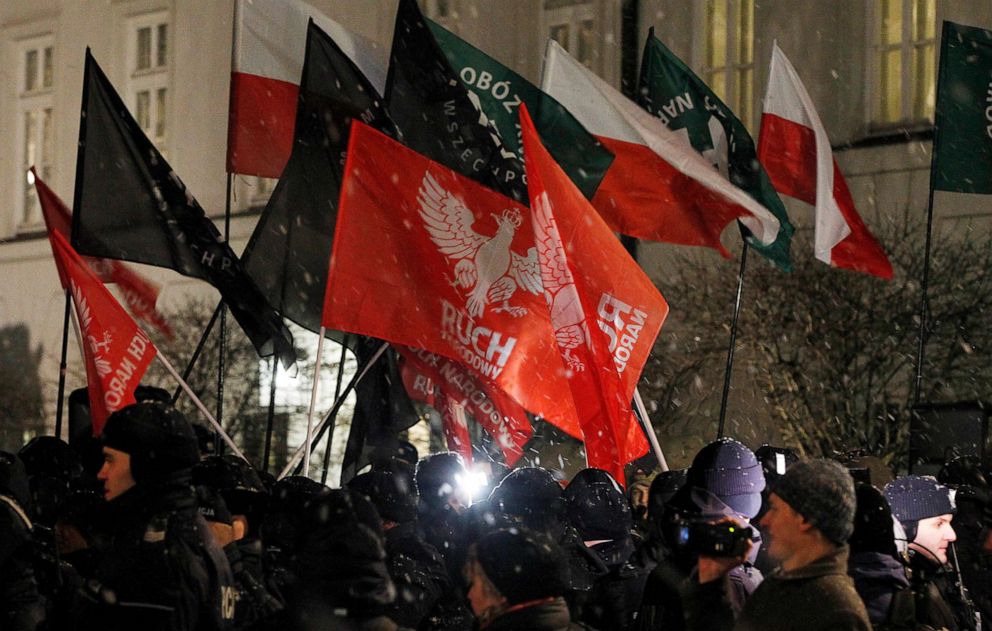Holocaust research could hinge on Polish libel case
Two renowned Holocaust historians are being sued for $27,000.
LONDON and MOSCOW -- An unusual libel case in Poland pertaining to the Holocaust has the potential to affect both the future of academic research as well as how the country comes to grips with its treatment of Jews during WWII, advocates say.
The case is the first of its kind brought to the Polish courts since a controversial 2018 law from the nationalist government made it a civil offense to make false accusations about Poland's history in the Holocaust.
Jewish organizations and historians have warned that the outcome, expected on Feb. 9, could be far-reaching -- affecting the fate of Holocaust research in the country, and poses an “enormous threat to freedom of speech.”
The case, against the historians Barbara Engelking and Jan Grabowski, hinges on just one paragraph published in the 1,600-page, two-volume collection that they co-edited, entitled “Night Without End: The Fate of Jews in Selected Counties of Occupied Poland.” An English translation of the book will be published by the University of Indiana in April.

At the center of the case is the now-deceased Edward Malinowski, the village elder of Malinowo, who in WWII both allegedly robbed and saved a Jewish woman, Estera Siemiatycka, by finding her work as a forced laborer. Had the Nazi authorities known she was Jewish, she would have been executed.
Siemiatycka, who is also deceased, testified in Malinowski's defense in a 1950 trial for alleged collaboration with Poland's Nazi occupiers and he was acquitted of the charges.
In the disputed paragraph, the historians based their claims on a later 1996 interview Siemiatycka gave to the Shoah Foundation at USC, which collected oral histories from the Holocaust. Recounting that testimony, the paragraph said that Siemiatycka “realized that [Malinowski] was an accomplice in the deaths of several dozen Jews who had been hiding in the woods and had been turned over to the Germans.” The paragraph also said her 1950 testimony was "false."
“After the war ended, he [Malinowski] would have been given the death penalty," Siemiatycka said in 1996. "I saved him, even though he did a lot of harm to me.”
"It was this source that I found most reliable for reconstructing the story of Estera Siemiatycka," Engelking told ABC News.
Engelking told ABC News she believed Siemiatycka had a "temporal and emotional" realization and the book suggested that she had given testimony supporting Malinowski because "she was grateful to him for saving her life, she wanted to repay him with good in spite of all the evil she had suffered from him."
Filomena Leszczyńska, Malinowski's 81-year-old surviving niece, with the help of the Polish Anti-Defamation League (RDI) -- a government-backed organization whose goal is "clarifying untrue information" about Poland's past -- has claimed that the paragraph in the book violated her personal rights by defaming "a Polish hero who hid Jews during WWII." The RDI argued in court that Engelking had mistaken the village elder for another Malinowo inhabitant of the same name when referring to trade dealings between the pair, and therefore the basis of their research was flawed.
"The paragraph does indeed contain an error, namely the attribution of trading with Estera to [elder] sołtys Malinowski but this in no way violates the personal rights of Edward Malinowski or his niece," Engelking said. "In the realm of research, such errors are reported at most in reviews or in subsequent publications and if the book has another addition an appropriate amendment is made."
Leszczyńska brought the case in Warsaw district court in June 2019 after hearing about the allegation on the radio, said Engelking, the founder and director of the Polish Center of Holocaust Research. Leszczyńska sued the historians for 100,000 Zloties ($27,000) and demanded an apology in several major newspapers last year.
"On the surface, the civil litigation at the heart of this story involves an old lady wanting to defend the good name of her family, allegedly tarnished by the authors of a book 'Night Without End,'" Grabowski told ABC News. "In reality, however, the entire lawsuit has been prepared, launched and financed by a militant right-wing, nationalistic organization funded directly by the Polish state and serving as a proxy for the Polish authorities," he added, referring to the RDI.
Grabowski, a professor of history at the University of Ottawa, also decried the reach of the claims in the case.

"Should the lawsuit be successful the alleged assault on 'national pride' or 'national identity' can trigger a lawsuit from anyone who considers his 'national identity' threatened by any given scholar," Grabowski said. "This, in practical terms, would place independent Polish scholars of the Holocaust in an impossible position. Which is precisely the goal which the authorities want to achieve."
Maciej Swirski, the head of the RDI, told ABC news that the organization is not using government funds in the case, and instead relies on crowdfunding. He said the case had "nothing to do with preventing scientific research."
"This private lawsuit's intention is to protect the memory of Ms. Leszczyńska's ancestor — the deceased Edward Malinowski, a hero, who rescued Jews during the war,” he told ABC News.
Historians and various Jewish societies across Europe say the case has potentially far-reaching implications.
“Lawsuits of such type aim above all to undermine the credibility and competence of the people sued to burden them financially, with high penalties and legal costs, and to provoke a “chilling effect” i.e. – in this case – to discourage other researchers from investigating and writing the truth about the extermination of Jews in Poland,” Engelking said.
The country has long struggled to come to grips with its wartime history. In 1939, 3.3 million Jews lived in Poland, but by the end of the war, 90% of them had died, with the remaining 300,000 survivors mostly living in the Soviet Union, according to the POLIN Museum of the History of Polish Jews.
This is not the first time the role of Poland in the Holocaust has been called into question in recent years. A diplomatic spat ensued with Israel over the passing of the controversial law of 2018, which initially made it a criminal offense to make false accusations about Poland's history in the Holocaust. The law was later amended to make this only a civil offense.
The current trial has prompted a tense exchange of letters this month between the Polish ambassador to Israel, Marek Magierowski, and the Center of Organizations of Holocaust Survivors in Israel. Magierowski wrote the lawsuit was a "civil case" and it would be a "malign interpretation" to consider the trial "an assault on freedom of research." The Polish Ministry of Foreign Affairs did not respond to ABC News’ request for comment.
There is more at stake in the trial than freedom of inquiry, but control over national identity, critics of the court case say.
The history of complicity and protection, at the heart of Malinowski’s story, encapsulates the broader struggles nationalists in the country have had in dealing with Poland’s role in the Holocaust, according to Gabriele Lesser, a journalist and historian who specializes in the occupation of Poland.
“As Barbara Engelking pointed out -- with specific sources supporting it -- that the same individual could both save Jews and denounce Jews,” she told ABC News. “This complexity is part of the reality of Judeo-Polish relations during the war… The nationalist camp which 'defends national pride' does not want to see this complexity. Judges are now placed in a situation of having to rule on research that goes beyond their required area of expertise.”
Mark Weitzman, director of government affairs at the Simon Wiesenthal Center Simon Wiesenthal Center, an NGO that combats anti-Semitism based in Los Angeles, said the court proceedings was an “attempt to use the legal system to muzzle and intimidate scholarship on the Holocaust in Poland.” And the Paris-based Foundation for the Memory of the Shoah said the case represented a “pernicious attack at the very heart of research.”
“Let's be frank: 100,000 Polish Zloties ($27K) is a lot of money in Poland,” Zygmunt Stępiński, the director of the POLIN Museum, told ABC News. “A Holocaust researcher will think twice before researching and publishing his/her findings in Poland. The new strategy is a form of censorship and intimidation of researchers before publishing their work, fearing persecution and charging them with legal defense costs.”
A verdict in the trial will be delivered on Feb. 9.




